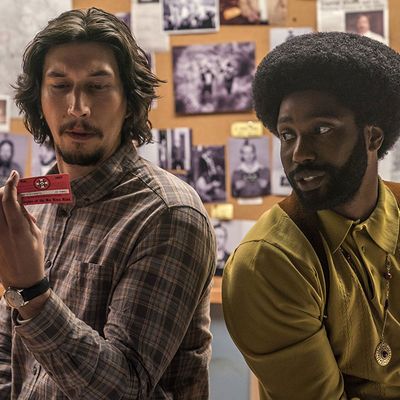
The opening titles of BlacKkKlansman, in all-caps typeface straight from a 1970s one-sheet, tell us that the story we’re about to watch is based on some “fo’ real, fo’ real sh*t.” (Asterisk theirs.) From its bombastic title on down, Spike Lee is in stylistic conversation with the blaxploitation genre, imagining his audacious real-life protagonist Ron Stallworth (John David Washington) as a self-styled vigilante in the style of John Shaft. Later in the film, Ron literally has a conversation about it, with his potential activist girlfriend. He’s trying to convince her that films like Coffy and Cleopatra Jones prove black cops can be a force for good. “That’s just blaxploitation fantasy,” she says with a sigh. So much of BlacKkKlansman’s improbable story line suggests a similar fantasy, and yet: fo’ real, fo’ real. Lee never takes his eye off the connecting thread between the events of 1978 and the present. The result is one of his most flat-out entertaining films in years, and also one of his most uncompromising.
Ron signs up for the Colorado Springs Police Force — encouraged by the “minorities welcome” note on the recruitment banner — and after the chief of police gives his afro a skeptical look up and down, he’s hired. He’s quickly bored by his rookie duties, fetching the criminal records of black men for white colleagues that barely veil their racism. So he requests to go into undercover work, and quickly gets more than he bargained for: He’s sent to “keep an eye” on Kwame Ture’s visit to the Colorado College Black Student Union, and monitor any Black Panther sympathy in the community. He convinces the chief of police that any worries of homegrown terrorism are overblown — and picks up a pig-hating love interest in the Student Union’s president, Patrice (Laura Harrier). But then an ad in the local classifieds draws his attention: a recruitment line for the local chapter of the Ku Klux Klan. He picks up the phone and gives them a call.
Ron is a fascinating character; his adeptness at code-switching is a part of his identity, and the reason he’s uniquely qualified for the job. It also brings him no small amount of angst, especially in his relationship with Patrice. There’s a lonely quality to Washington’s performance, the feeling of being everywhere and nowhere at the same time. Ron finds some camaraderie when he gets moved to Intelligence, however, particularly with Flip (Adam Driver), a fellow cop quietly keeping his Judaism a semi-secret. When he starts pursuing his infiltration of the Klan, Flip becomes his real-world double, while Ron does all the phone work — a white Ron and a black Ron, working in tandem as the titular paradoxical figure.
Adam Driver is spectacular here; in many ways, his transformation while working with Ron is just as compelling as Ron’s in its subtlety. Flip admits he never had to think much about his identity because he wasn’t raised culturally Jewish and never had to identify with it one way or the other. “Now,” he says, after withstanding some upsetting questioning by one of the Klan members who suspects he might not be Aryan Pure, “I think about it all the time.” Lee may have set his story between the extremes of the Black Power movement and white supremacists, but he grapples sensitively with two lead characters who find themselves somewhere in between. Some of the KKK characters are more caricatured in their repellent, all-consuming racism (Jasper Pääkkönen didn’t work for me as one particularly unhinged Klan member; Ashlie Atkinson as his wife is more complex in her monstrosity). But Topher Grace as the grand wizard David Duke himself is troubling on another level, mild-mannered, almost lackadaisical in his geniality, and utterly convicted of his total hatred.
The last proper “shot,” technically speaking, of BlacKkKlansman is so powerful, such a head rush, that Lee could have easily sent us out into the present with it, invigorated and clear-eyed and angry and ever-hopeful. But then he literally brings us into the present, cutting to a reel of the horrific footage from the Charlottesville, Virginia, white-power rally and counterprotest, including the car assault that resulted in the death of Heather Heyer. Lee plays with allusions to Trump and our present-day American mess throughout the film, sometimes more corny and wink-y than others, but the final minutes remove any semblance of joking. BlacKkKlansman is a nuanced story of race in America, but Lee doesn’t take any chances with vagueness or ellipses, nor should he. As much as BlacKkKlansman plays with the mechanics of blaxploitation fantasy, it doesn’t leave one with any question about what’s real.

